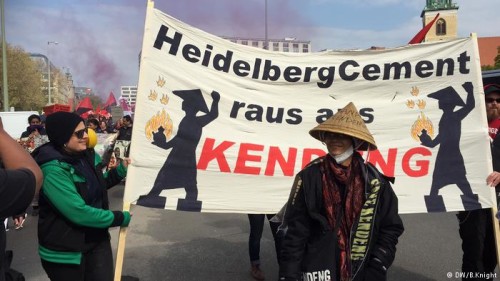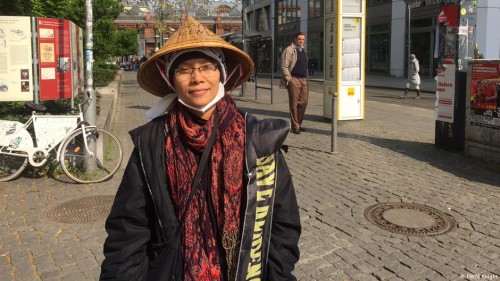Indonesian farmer joins May 1 rally to protest German cement
Deutsche Welle, 01 May 2017
http://p.dw.com/p/2cBcp
by Ben Knight
Indonesians took part in the annual May 1 demonstrations in Berlin to protest the destruction of their livelihoods by HeidelbergCement. The German cement company denies their new plant will do environmental damage.
The May 1 protests in Berlin are more than a violent free-for-all for angry leftists. In fact, the traditional demonstrations in Germany’s capital attract a kaleidoscope of flags representing a welter of causes.
On Monday, the banner-wielding trade unionists, black-clad anarchists, and multi-colored left-wing activists dragging punk-pumping amplifiers were joined by a short, self-assured 41-year-old woman wearing thick gloves, a white face mask, and a pointed straw hat.
Invited by Berlin organization Watch Indonesia!, this was Gunarti’s first trip outside her country, where she farms rice, corn, and vegetables in the mountainous Kendeng region in central Java.
Cement versus water
Gunarti is a member of the Samin people, an indigenous group that lives beyond the state, follows its own religion, farms without chemical fertilizers, and hasn’t paid taxes since Indonesia gained independence in 1945.
But now this secluded livelihood (any food they can’t sell themselves only goes as far the local market) is being threatened by HeidelbergCement, the world’s second biggest cement producer, which – through Indocement, a company it majority owns – wants to build yet another cement plant in Indonesia, a country of 250 million people currently in the grip of a cement thirst.
Kendeng activists, who have been fighting since 2010 to keep cement production out of a region that was previously protected by conservation laws, say the industrial processes are devastating for the environment. Mountains have to be destroyed to dig the necessary limestone quarries, which disrupt the natural water circulation and therefore the farming in the region.
Gunarti says that half of the 2,700-hectare area that Indocement is about to build on is settled by 50 or 60 farming families, but she says thousands more like her will be affected – entire villages will have to be resettled while farmers are removed from the land.
“I came to Germany to remind people here that this cement will destroy our livelihoods, because we are dependent on the water coming from the Kendeng hills,” she told DW, in Javanese through an interpreter. “It’s not only the people in the place where they want to build the plant who need the water – all the people in the area are dependent on the many springs in the mountains.”
Concrete denials
The cement issue (the state-owned firm Semen Indonesia is planning another contentious plant in central Java) has become major news in Indonesia, which is the world’s biggest cement producer. This is thanks in part to a series of slightly grueling protests: a few weeks ago, Gunarti and 50 other protesters spent ten days outside the presidential palace in Jakarta with their feet set in cement.
Though the farmers, represented by the protest group JMPPK, won a provincial court ruling in 2015, the company and the Indonesian government won a supreme court case on appeal last year, meaning the legal path to building the plant is now clear.
“We don’t understand why the facts that were convincing at the first level – which were so obvious – why the judges with the same facts can make another decision,” said Gunarti.
HeidelbergCement denies that its new plant will have the impact that Gunarti claims. In a statement published last week, the Baden-Württemberg firm claimed that its new factory had been planned “with great care over several years,” and that these painstaking preparations involved “several meetings with local residents, including representatives of the Samin people.”
“The water supply for local residents will not be affected,” it added, because “the water supply of the plant will be covered by surface water, which will be stored in specially installed containment basins. The water will come mainly from rainfall from the rainy season and will be taken from a neighboring river.”
The company also claimed that an environmental survey carried out by the government proved that the plant was “ecologically sustainable.” But protesters say it was based on incorrect data, and studies undertaken at another Indocement plant suggest that cement plants use up groundwater reserves and result in more harmful nitrates in water supplies.
HeidelbergCement also claims that some 250,000 people living near three of its current Indonesian cement plants were profiting from investments. Gunarti was having none of this: “On the contrary, our livelihoods will be lost if they build the plant,” she said. “We have enough to live with our farming, we don’t need more than that.”
Gunarti is in the middle of touring ten cities in Germany with a documentary about the story, and is set to speak to HeidelbergCement’s shareholders at its general assembly in Heidelberg on May 10. “We want to ask them not to invest in something that is destroying our environment and our livelihoods,” she said. “We really hope we get a lot of solidarity among the German people for our cause.”









